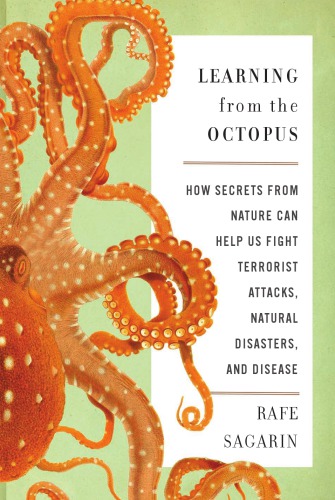
Learning From the Octopus
How Secrets from Nature Can Help Us Fight Terrorist Attacks, Natural Disasters, and Disease
کتاب های مرتبط
- اطلاعات
- نقد و بررسی
- دیدگاه کاربران
نقد و بررسی

February 6, 2012
A marine biologist applies his expertise to national security, delivering some ingenious ideas. He points out that 3.5 billion years of evolution have given plants and animals tactics that can serve us in dealing with terrorism, hurricanes, and epidemics. Sagarin, environment policy analyst at the University of Arizona, writes that, confronted with a threat, governments, inherently unadaptable, gather specialists to anticipate the next disaster and devise an often clunky plan. Organisms, on the other hand, never plan or anticipate; they adapt and also learn to live with a tolerable level of insecurity. Security in nature is never centralized; every herd animal keeps an eye out. Eradicating risk is impossible because the threat also adapts, e.g., insurgencies adapt faster than standing armies. Sagarin proposes that governments are too cumbersome to adapt, and that we should devise an “adaptable cascade” with decentralized multiple problem solvers. Occasionally, the theory misfires (a politician who advocates tolerating a modest level of terrorism will enjoy a short career), but few readers will deny that Sagarin is onto something. Agent: Esmond Harmsworth, Zachary Shuster Harmsworth Literary Agency.

February 1, 2012
A marine ecologist looks at social problems from the perspective of natural science. Sagarin (Environmental Policy/Univ. of Arizona) identifies adaptability as the key to survival in an uncertain world. Improvised responses to threats--the "hillbilly armor" U.S. troops adopted to defend against roadside IEDs--are a clear example. A key point is that natural selection operates not just in the wild but in modern asymmetrical warfare, where lightly armed insurgents take on large professional armies. The high casualty rate among insurgents is a selective pressure; the stupid and incompetent are killed off, and those who survive are better equipped to fight on--as the Taliban has done in Afghanistan. The author argues that dedicated task forces are less effective at problem solving than independent groups seeking answers to a specific challenge. Redundant features, which efficiency experts hate, aid survival by preserving vital information, and cooperation and exchange of information among organisms in the same environment is a major tool for increased security. Sagarin cites cooperation among Middle East countries, bitter rivals in many ways, that helped slow the spread of H1N1 in 2009-10. Even the apparently irrational "sacred truths" of religious minorities can be turned to assets in the survival of larger groups, by such simple means as athletics. The author is sometimes too abstract in his approach. However, when gives real-life examples, either from nature or from human society, the points are usually convincing, and he provides plentiful documentation. Opens interesting doors--it would be good to see more along this line.
COPYRIGHT(2012) Kirkus Reviews, ALL RIGHTS RESERVED.

























دیدگاه کاربران